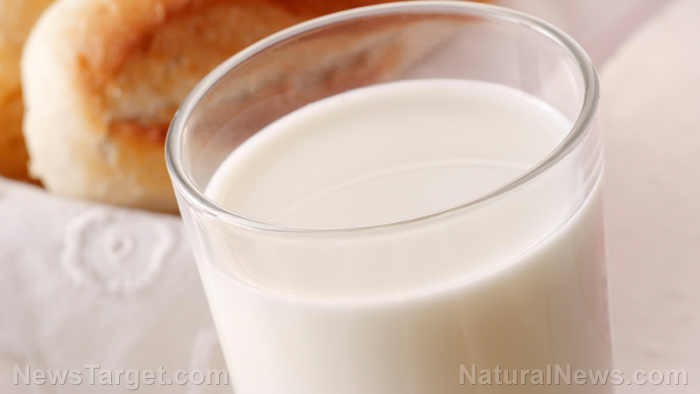Drink up: The risks of full-fat milk are MYTH
07/05/2017 / By Frances Bloomfield

Lovers of full-fat milk rejoice: Your dairy drink of choice is no longer the so-called “worst” variety of milk on the market. What was once maligned for supposedly contributing to weight gain and heart disease has since been redeemed by numerous health studies. According to the DailyMail.co.uk, the warnings against full-fat milk could, in fact, be considered pure myth.
Take for example the outrageous claim that full-fat milk can and will make you fat. A 2016 study has stated otherwise. Based on a long-term study of over 18,000 middle-aged women, the researchers discovered that high-fat dairy actually reduced the likelihood of becoming overweight. However, the same couldn’t be said for low-fat dairy. This may be because full-fat dairy actually makes you feel fuller and prevents you from overeating. “By eating the full-fat form of dairy products, you might actually eat fewer calories throughout the day than you would otherwise,” explained Brian Quebbemann, a bariatric surgeon from the Chapman Medical Center in California.
And what of the connection between milk (full fat, low fat, or otherwise) and heart disease? Well, according to a recent study published in the European Journal of Epidemiology, the connection is essentially non-existent. The analysis of 29 studies, which were carried out over a 35-year period, found no association linking coronary heart disease and cardiovascular disease to dairy products like milk, cheese, and yogurt.
Moreover, regularly drinking full-fat milk could help protect you against diabetes. This was the conclusion researchers of a 15-year study came to; specifically, people who consumed the most dairy fat were 46 percent less likely to develop type-2 diabetes compared to those who consumed the least amount of dairy fat. Once again, this can be backed up by science: the fat in full-fat dairy delays the absorption of milk sugar, and as a result blood sugar and insulin will rise at a much slower pace. The less insulin there is circulating around the body, the lower the risk of developing insulin resistance and diabetes.
With all of these in mind, it’s safe to say that full-fat milk is one of the, if not the best, milk varieties available in the market. But before you head down to your local grocery to stock up your fridge with a few cartons, note that not all full-fat milks are made equal. In fact, some may actually harm you in the long run simply because their fat isn’t of the healthy sort.
Most full-fat milks undergo pasteurization in order to increase shelf life and kill any dangerous bacteria found in the milk. Unfortunately, this process results in nutritional content degradation. Beneficial enzymes and vitamins either die out during pasteurization or become deteriorated. Fats are no exception; pasteurization destroys the chemical integrity of the healthy fats and makes them more susceptible to spoilage. Furthermore, the absence of fats greatly interferes with the solubility of certain important nutrients found in milk, namely vitamins A, D, E, and K.
So what milk should you be drinking, then? Raw, non-homogenized milk, of course. This type of milk is packed with saturated fats, the healthiest and most stable fat for human consumption. In addition to helping your body absorb milk vitamins, the fats found in raw milk contain anti-inflammatory properties. Raw milk also has a higher fat content than most commercial whole milks: four percent fat against the standard 3.5 percent. This isn’t even taking into consideration the numerous other health benefits of raw milk, which include but aren’t limited to being loaded with friendly microorganisms, bioavailable vitamins, as well as offering protection against allergies. (Related: The evidence is in: Raw milk actually boosts immunity, prevents infections)
Visit Fresh.news for more stories about what foods are good for you.
Sources include:
Submit a correction >>
Tagged Under:
This article may contain statements that reflect the opinion of the author
RECENT NEWS & ARTICLES
COPYRIGHT © 2017 SUPER FOODS NEWS





















